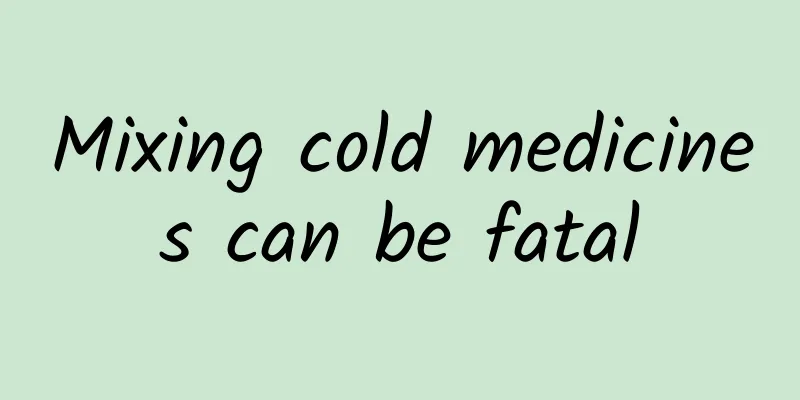Mixing cold medicines can be fatal

|
As winter approaches, various respiratory diseases are prevalent, and colds have become an unavoidable topic. However, taking cold medicines is not necessarily better. The wrong way of taking medicines may bring serious health risks. So, what are the dangers of taking multiple cold medicines at the same time? What principles should be followed when taking medicines? Taking multiple cold medicines at the same time may lead to drug poisoning Most cold medicines on the market are compound preparations, usually containing multiple ingredients, such as acetaminophen, ibuprofen, pseudoephedrine hydrochloride, chlorpheniramine maleate, amantadine hydrochloride, artificial bezoar, caffeine, etc. The main effects of these ingredients include antipyretic and analgesic, anti-allergic, cough and expectorant, and relieving nasal congestion. If you take multiple cold medicines at the same time, it may cause the following hazards: Overdose of medicine. There are many types of cold medicines on sale, but the ingredients are similar. Taking several cold medicines at the same time can easily lead to overdose. For example, acetaminophen is the main ingredient of many cold medicines and has antipyretic and analgesic effects. Within the recommended dose, cold medicines containing acetaminophen are safe for adults and children, but overdose may lead to drug poisoning, liver damage or even acute liver failure. Pseudoephedrine can constrict blood vessels and relieve nasal congestion and nasal congestion symptoms. It is a very common ingredient in compound cold medicines. However, overdose can easily cause adverse reactions in the cardiovascular system, such as palpitations, hypertension, arrhythmias, etc. Drug interactions occur. When two or more drugs are used simultaneously or successively, the strength, duration, and even properties of one or more of the drugs may change to varying degrees due to the interaction between the drugs. For example, chlorpheniramine maleate combined with antipyretic and analgesic drugs can enhance the latter's analgesic and cold symptom relief effects; combined with central nervous system sedatives, hypnotics, or ethanol, it can increase the inhibitory effect on the central nervous system. In addition, chlorpheniramine maleate can also enhance the effects of antidepressants, so the two should not be used together. Cause drug allergies. Some people may have allergic reactions to certain ingredients in cold medicines. If you take multiple cold medicines at the same time, it may increase the chance of allergies or aggravate the degree of allergies, resulting in rashes, breathing difficulties, or even shock. Do not increase or decrease the dose, extend or shorten the medication time at will. In order to avoid the harm caused by taking multiple cold medicines at the same time, the following principles should be followed when taking medicines: Take as needed. The more cold medicine you take, the faster you will get better. The common cold is usually caused by viruses. Under the guidance of a doctor or pharmacist, choose the appropriate symptomatic medicine according to clinical symptoms. Don't blindly follow the trend or believe in advertisements. Take it on time. Cold medicine should be taken according to the doctor's instructions or the dosage in the instructions. Do not increase or decrease the dosage or extend or shorten the medication time at will. Generally speaking, the interval between taking cold medicines should be more than 4-6 hours, and the total daily dose should not exceed the recommended maximum dose. For example, the maximum dose of acetaminophen is 2 grams per day, and the maximum dose of pseudoephedrine hydrochloride is 240 mg per day. In addition, the time of taking cold medicine should also be noted. Some cold medicines contain stimulant ingredients such as caffeine or pseudoephedrine hydrochloride, which should not be taken at night to avoid affecting sleep quality; some cold medicines contain sedative ingredients such as chlorpheniramine maleate, which should not be taken during the day to avoid affecting work and study efficiency. Pay attention to the use of medicines by special groups. Cold medicines should be used according to the patient's physical condition and health status. Do not blindly imitate others or arbitrarily self-diagnose and use medicines. Especially pregnant women, breastfeeding women, children, the elderly, and those with liver and kidney dysfunction should carefully choose and use cold medicines under the guidance of doctors or pharmacists to avoid harm to themselves or the fetus. (The author is the deputy chief pharmacist of the Department of Clinical Pharmacy, the First Hospital of Hebei Medical University) |
>>: Does the child need to go to the hospital immediately if he has a fever?
Recommend
Why do women with gestational hypertension give birth to more girls?
It is wrong for everyone to simply understand ges...
What is the problem of high C-reactive protein during pregnancy? How to treat high C-reactive protein during pregnancy?
C-reactive protein is an indicator that is includ...
How to make the cervix open faster during induction of labor
Women all hope that everything will go smoothly a...
Can scar removal cream completely remove scars?
Not really While scar removal creams can help imp...
Why didn't it bleed the first time?
Some young friends who have just entered the temp...
What are the uses of tangerine peel? Does tangerine peel have any side effects?
Tangerine peel can nourish the stomach and regula...
Can I still use test strips for threatened abortion?
For situations such as threatened miscarriage. Fr...
What are the recipes for women to enlarge their breasts in winter?
Although we often hear some female friends joking...
Will the bar on the pregnancy test stick disappear?
If you find that your period has not come on time...
Meat-like substance in menstrual discharge
Many women find that there is something like meat...
What should I do if I feel bad and suffer from insomnia during the third month of pregnancy?
Many pregnant mothers have recently experienced m...
Stop blindly following internet celebrities to learn how to resist sugar. Do you really understand glycation?
A famous actress gave up sugar for ten years and ...
What should a 47-year-old woman do if her menstruation is irregular?
47 years old is a rather special stage for women....
Women, use your secret weapon
1. Massage the places you want to be beautiful Pe...
When will the embryo flow out on the third day of medical abortion?
When the baby first exists in the mother's be...









